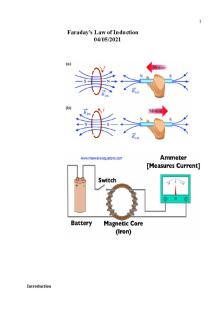CH-127 Lab #6 PDF

| Title | CH-127 Lab #6 |
|---|---|
| Author | Ahmed Musawar |
| Course | Introductory College Chemistry |
| Institution | Queensborough Community College |
| Pages | 2 |
| File Size | 82.6 KB |
| File Type | |
| Total Downloads | 103 |
| Total Views | 135 |
Summary
Lab Report...
Description
Title of the experiment Electrical Conductivity of Aqueous Solutions: Electrolytes and Nonelectrolytes
Ahmed Musawar Daemee Kim
Professor Wong Chemistry-127 J5B Date of the Experiment 03/09/2018
Objective
The purpose of this experiment is to test various aqueous and non aqueous solutions of compounds for electrons in the solutions to then determine if the solutions contains strong, weak, or non-electrolytes if the light bulb lights due to electrolytes present.
Introduction Ionic compounds dissociate into positively charged ions, cations and negatively charged ions,anions when dissolved in water. Ions become surrounded by water molecules, therefore considered aqueous (aq). Aqueous ions are able to conduct electric current. A compound with strong electrolytes can easily conduct electric current. A compound with weak electrolytes can conduct weak electric current. A compound with non-electrolytes will conduct no electric current since they have no ionization.
Conclusion Our objective was achieved as we found together in class about aqueous solutions, how it affect a compound (either molecular or Ionic) and also we determine that which solutions are strong electrolytes, weak electrolytes or non-electrolytes. In our experiment we found most of the Ionic compounds are either strong or weak electrolytes with the exception of
NACL(s ) and
NaHC O3 (s) . We also found that in our experiment almost all the molecular compounds are nonelectrolytes with the exception of
C H 3 COOH (aq) this is according to our experiment,
there might be some else nonelectrolyte molecular compounds. We also determined that if NACL is (aq) then it will be strong electrolyte, just because the addition of water, cations and anions separate in water and it conducts the electricity which makes it strong electrolyte, same with the
NaHC O3 (aq) . We also determine that strong electrolyte are compounds that
completely dissociate in water, while a weak electrolyte only partially dissociates in water. A non-electrolyte will dissolve, but not dissociate at all within the water. Strong electrolyte means bright light, while weak means dim and nonelectrolyte means no light at all....
Similar Free PDFs

Lab 6 - Lab 6
- 10 Pages

Lab 6 - Lab Report
- 6 Pages

LAb 6 - Lab
- 1 Pages

Lab 6 Nitration LAB
- 5 Pages

Lab 6 - lab answer
- 6 Pages

Lab 6 Chem 112 - Lab 6
- 2 Pages

Phys lab 6 - Lab report 6
- 13 Pages

Lab Report Nr 6 - lab 6
- 7 Pages

Unit 6 lab - Unit 6 lab
- 1 Pages

Friction Lab - Lab 6 Conclusion
- 2 Pages

Lab 6 Stability-2 - lab
- 11 Pages

Chapter 6 Lab - lab assignment
- 7 Pages

Orgo Lab 6 - Lab report
- 6 Pages

Lab 6 - Audio Frequency Lab
- 3 Pages

eScience Lab 6: Diffusion
- 8 Pages
Popular Institutions
- Tinajero National High School - Annex
- Politeknik Caltex Riau
- Yokohama City University
- SGT University
- University of Al-Qadisiyah
- Divine Word College of Vigan
- Techniek College Rotterdam
- Universidade de Santiago
- Universiti Teknologi MARA Cawangan Johor Kampus Pasir Gudang
- Poltekkes Kemenkes Yogyakarta
- Baguio City National High School
- Colegio san marcos
- preparatoria uno
- Centro de Bachillerato Tecnológico Industrial y de Servicios No. 107
- Dalian Maritime University
- Quang Trung Secondary School
- Colegio Tecnológico en Informática
- Corporación Regional de Educación Superior
- Grupo CEDVA
- Dar Al Uloom University
- Centro de Estudios Preuniversitarios de la Universidad Nacional de Ingeniería
- 上智大学
- Aakash International School, Nuna Majara
- San Felipe Neri Catholic School
- Kang Chiao International School - New Taipei City
- Misamis Occidental National High School
- Institución Educativa Escuela Normal Juan Ladrilleros
- Kolehiyo ng Pantukan
- Batanes State College
- Instituto Continental
- Sekolah Menengah Kejuruan Kesehatan Kaltara (Tarakan)
- Colegio de La Inmaculada Concepcion - Cebu
